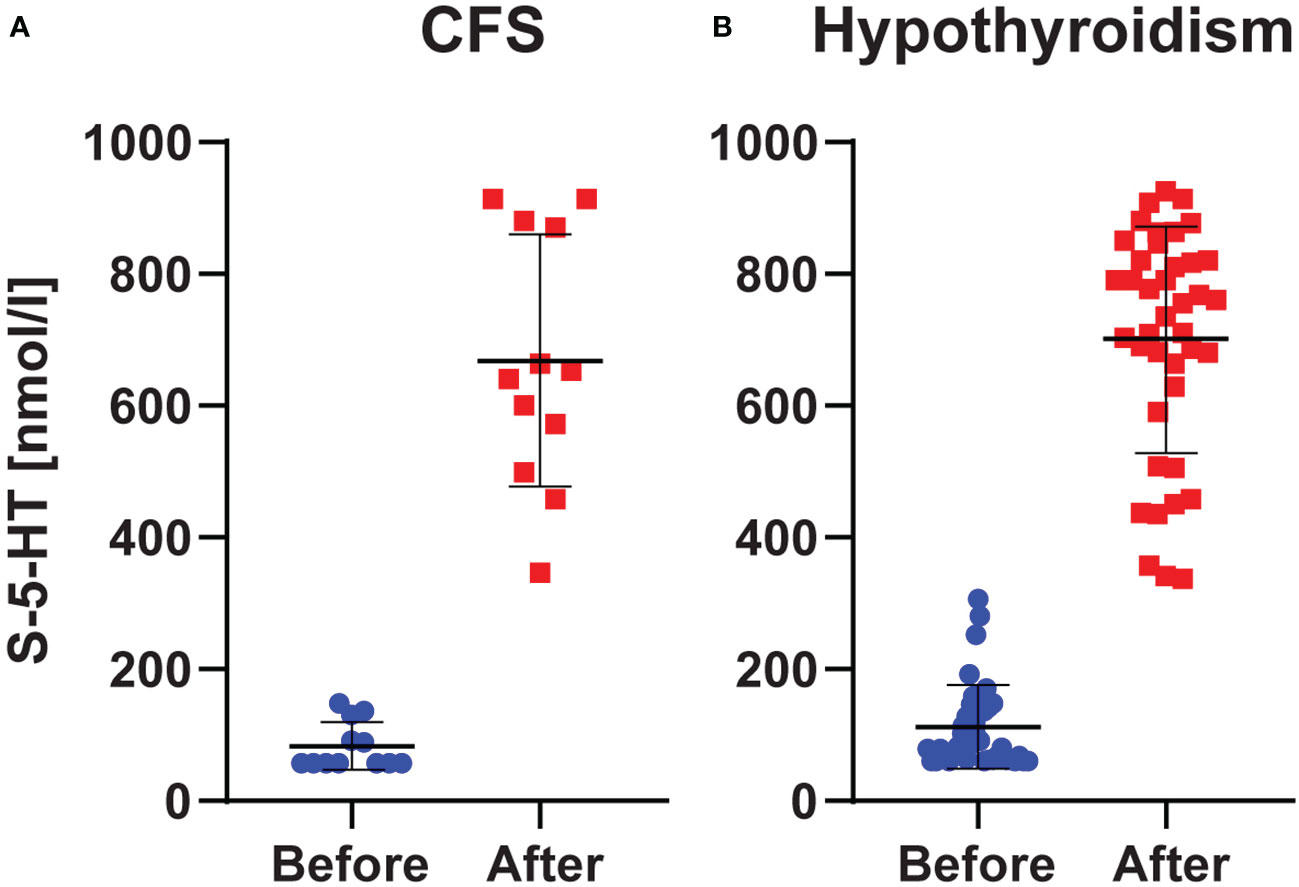Dolphin
Senior Member (Voting Rights)
https://www.frontiersin.org/journals/endocrinology/articles/10.3389/fendo.2024.1358404/abstract
BRIEF RESEARCH REPORT article
Front. Endocrinol.
Sec. Neuroendocrine Science
Volume 15 - 2024 | doi: 10.3389/fendo.2024.1358404
Association between fatigue, peripheral serotonin, and L-carnitine in hypothyroidism and in chronic fatigue syndrome
Provisionally accepted
 Tommi Raij1*
Tommi Raij1*
 Kari Raij2
Kari Raij2
Background:
Fatigue of unknown origin is a hallmark symptom in chronic fatigue syndrome (CFS) and is also found in 20% of hypothyroidism patients despite appropriate levothyroxine treatment.
Here, we suggest that in these disorders, peripheral serotonin levels are low, and elevating them to normal range with L-carnitine is accompanied with reduced fatigue.
Methods:
We conducted a retrospective analysis of follow-up clinical data (CFS N=12; hypothyroidism with fatigue N=40) where serum serotonin and fatigue levels were compared before vs. after 7 weeks of oral L-carnitine supplementation.
Results:
After L-carnitine, serotonin increased (8-fold in CFS, Sig. = 0.002, 6-fold in hypothyroidism, Sig. < 0.001) whereas fatigue decreased (2-fold in both CFS and hypothyroidism, Sig. = 0.002 for CFS, Sig. < 0.001 for hypothyroidism).
There was a negative correlation between serotonin level and fatigue (for CFS, rho = -0.49 before and -0.67 after L-carnitine; for hypothyroidism, rho = -0.24 before and -0.83 after L-carnitine).
Conclusions:
These findings suggest a new link between low peripheral serotonin, L-carnitine, and fatigue.
Keywords: Peripheral serotonin, L-Carnitine, Fatigue, Hypothyroidism, Chronic fatigue syndrome (CFS), Myalgic encephalomyelitis (ME), Systemic exertion intolerance disease (SEID), Mitochondria
Received: 19 Dec 2023; Accepted: 15 Feb 2024.
BRIEF RESEARCH REPORT article
Front. Endocrinol.
Sec. Neuroendocrine Science
Volume 15 - 2024 | doi: 10.3389/fendo.2024.1358404
Association between fatigue, peripheral serotonin, and L-carnitine in hypothyroidism and in chronic fatigue syndrome
Provisionally accepted
 Tommi Raij1*
Tommi Raij1*

- 1 MGH/MIT/HMS Athinoula A. Martinos Center for Biomedical Imaging, Harvard Medical School, Boston, MA, United States
- 2 Kruunuhaka Medical Center, Helsinki, Finland
Background:
Fatigue of unknown origin is a hallmark symptom in chronic fatigue syndrome (CFS) and is also found in 20% of hypothyroidism patients despite appropriate levothyroxine treatment.
Here, we suggest that in these disorders, peripheral serotonin levels are low, and elevating them to normal range with L-carnitine is accompanied with reduced fatigue.
Methods:
We conducted a retrospective analysis of follow-up clinical data (CFS N=12; hypothyroidism with fatigue N=40) where serum serotonin and fatigue levels were compared before vs. after 7 weeks of oral L-carnitine supplementation.
Results:
After L-carnitine, serotonin increased (8-fold in CFS, Sig. = 0.002, 6-fold in hypothyroidism, Sig. < 0.001) whereas fatigue decreased (2-fold in both CFS and hypothyroidism, Sig. = 0.002 for CFS, Sig. < 0.001 for hypothyroidism).
There was a negative correlation between serotonin level and fatigue (for CFS, rho = -0.49 before and -0.67 after L-carnitine; for hypothyroidism, rho = -0.24 before and -0.83 after L-carnitine).
Conclusions:
These findings suggest a new link between low peripheral serotonin, L-carnitine, and fatigue.
Keywords: Peripheral serotonin, L-Carnitine, Fatigue, Hypothyroidism, Chronic fatigue syndrome (CFS), Myalgic encephalomyelitis (ME), Systemic exertion intolerance disease (SEID), Mitochondria
Received: 19 Dec 2023; Accepted: 15 Feb 2024.


